| Srl | Item |
| 1 |
ID:
115766
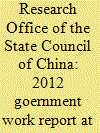

|
|
|
|
|
| Edition |
1st
|
| Publication |
Beijing, People's Publishing House and China Yanshi Publishers, 2012.
|
| Description |
450p.
|
| Contents |
Text in Chinese Language
|
| Standard Number |
9787010107271
|
|
|
|
|
|
|
|
|
|
|
|
Copies: C:1/I:0,R:0,Q:0
Circulation
| Accession# | Call# | Current Location | Status | Policy | Location |
| 056891 | 951/RES 056891 | Main | On Shelf | General | |
|
|
|
|
| 2 |
ID:
118456


|
|
|
| 3 |
ID:
063368
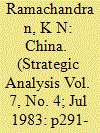

|
|
|
| 4 |
ID:
064551
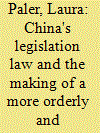

|
|
|
| 5 |
ID:
162790
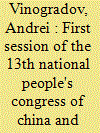

|
|
|
|
|
| Summary/Abstract |
This article discusses the first session of the 13th National People's Congress held in Beijing on March 5-20, 2018, and important personnel and legislative decisions adopted. We consider issues of political transformations in the context of changes in the PRC Constitution and the relationship between the CPC and the Chinese state. Special attention is paid to staff appointments and amendments to the Constitution and the PRC Law On Supervision. We include detailed analysis of amendments to the basic law of the country that incorporate the name of Xi Jinping and the concept of "socialism with Chinese specificity for a new era," removal of the PRC Chairman's term limits, and constitutional and legal consolidation of the supervisory commissions status within the system of state authorities.
|
|
|
|
|
|
|
|
|
|
|
|
|
|
|
|
| 6 |
ID:
166151


|
|
|
|
|
| Summary/Abstract |
In this research note, we introduce a new dataset on China's national legislators. It provides descriptive information on one key parameter: the nature of the business owned by private entrepreneur deputies in China's National People's Congress (NPC) from 2003 to 2017. The dataset contains information on whether the deputy once worked as a government official, whether the deputy was a former top manager of a state-owned/collective enterprise, and whether his/her current company was a state-owned/collective enterprise before being privatized. We categorize deputies as “insiders” as long as they stratify one of the aforementioned backgrounds, whereas others as the “grassroots.” This dataset thus reveals two types of private entrepreneur deputies who are significantly different with regard to how they started their own businesses. These findings shed new light on the relationship between private entrepreneurs and the party-state in China.
|
|
|
|
|
|
|
|
|
|
|
|
|
|
|
|
| 7 |
ID:
192516
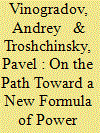

|
|
|
|
|
| Summary/Abstract |
This paper is devoted to the political, legal, and state development of the People's Republic of China from 2018 to early 2023. Based on reports presented at the first session of the 14th National People's Congress (March 2023), we examine the main performance indicators of the State Council, the Standing Committee of the National People's Congress, the Supreme People's Court, and the Supreme People's Procuratorate. We also analyze the personnel lineup of the 14th National People's Congress. This paper presents the main resolutions passed by the National People's Congress and its Standing Committee from 2018 to 2023 in the constitutional, criminal, civil, and administrative fields. The authors predict the development of the PRC's legal system in the near future. The Standing Committee of the National People's Congress has passed several important laws, including the Law on Countering Foreign Sanctions and amendments to the current Criminal Code that lower the age of criminal responsibility to 12 years. The law-enforcement and judicial systems have demonstrated a high degree of effectiveness in combating conventional crime. Overall, amid the volatile international situation and rising tensions in the South China Sea and Taiwan Strait, the Chinese leadership has focused on improving the combat readiness of the armed forces, strengthening national defense, and ensuring national security, including through the adoption of appropriate legal acts.
|
|
|
|
|
|
|
|
|
|
|
|
|
|
|
|
| 8 |
ID:
163420


|
|
|
|
|
| Summary/Abstract |
This article attempts to discover whether the National People’s Congress (NPC), China’s law-making body, is becoming more specialized and thereby losing its rubber-stamp image. The exploration of the composition of the NPC’s permanent committees demonstrates that specialization is indeed a discernible trend. More and more social elites have been co-opted onto them. The empirical results further attest to the usefulness of the information efficiency theory. Unfortunately, specialization has yet to give the Chinese legislature more autonomy. Only 30% of committee members are privileged to serve more than one five-year term. The influence of the Party-state core and the lack of membership stability have put additional restraints on the NPC’s autonomy.
|
|
|
|
|
|
|
|
|
|
|
|
|
|
|
|